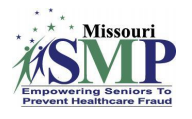Written by Missouri SMP

The Missouri SMP wants you to be on the lookout for fraud related to COVID-19 contact tracing.
Contact tracing helps to slow the spread of COVID-19 and helps protect you, your family, and your community by letting people know they may have been exposed to COVID-19. It helps people get testing if they need it and lets them know if they need to isolate or quarantine.
Unfortunately, scammers also see contact tracing as a new opportunity to defraud you, to get your personal information, and use it with bad intentions.
Here’s how you can protect yourself:
Be cautious of anyone who asks for specifics about your health insurance, like your Medicare number.
Be wary of anyone who claims they need a credit card or cash to pay for a COVID-19 test.
Be cautious of anyone who wants your personal information to set up a COVID-19 test.
Legitimate contact tracers will be state or local Department of Health employees or their contractors. They will ask about your symptoms to screen you for possible COVID-19 infection.
A contact tracer will ask you about who you may have come into contact with recently. They also will be able to refer you to other medical and social resources. They may ask you if you have insurance so that they can help connect uninsured people with resources. They will not demand a personal credit card, Medicare number or bank account information in exchange for a test.
The Missouri SMP stands ready to provide you with the information you need to protect yourself from Medicare fraud, errors, and abuse; to detect potential fraud, errors, and abuse; and report your concern. To learn more or report suspected Medicare fraud, call the Missouri SMP at 1-888-515-6565.
This project was supported, in part by grant number 90MPPG0040, from the U.S. Administration for Community Living, Department of Health and Human Services, Washington, D.C. 20201. Grantees undertaking projects under government sponsorship are encouraged to express freely their findings and conclusions. Points of view or opinions do not, therefore, necessarily represent official Administration for Community Living policy.
